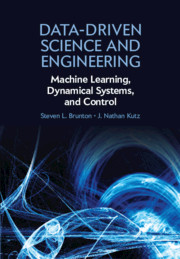Crossref Citations
This Book has been
cited by the following publications. This list is generated based on data provided by Crossref.
Fathi, Kiavash
and
Mahdavi, Mehdi
2019.
Control System Response Improvement via Denoising Using Deep Neural Networks.
p.
0377.
Nauman, Farrukh
and
Nättilä, Joonas
2019.
Exploring helical dynamos with machine learning: Regularized linear regression outperforms ensemble methods.
Astronomy & Astrophysics,
Vol. 629,
Issue. ,
p.
A89.
Demo, Nicola
Tezzele, Marco
and
Rozza, Gianluigi
2019.
A non-intrusive approach for the reconstruction of POD modal coefficients through active subspaces.
Comptes Rendus Mécanique,
Vol. 347,
Issue. 11,
p.
873.
Alassaf, Abdullah
and
Fan, Lingling
2019.
Dynamic Mode Decomposition in Various Power System Applications.
p.
1.
Di, Zhenzhen
Chang, Miao
Guo, Peikun
Li, Yang
and
Chang, Yin
2019.
Using Real-Time Data and Unsupervised Machine Learning Techniques to Study Large-Scale Spatio–Temporal Characteristics of Wastewater Discharges and their Influence on Surface Water Quality in the Yangtze River Basin.
Water,
Vol. 11,
Issue. 6,
p.
1268.
Callaham, Jared L.
Maeda, Kazuki
and
Brunton, Steven L.
2019.
Robust flow reconstruction from limited measurements via sparse representation.
Physical Review Fluids,
Vol. 4,
Issue. 10,
Mohren, Thomas L.
Daniel, Thomas L.
and
Brunton, Steven L.
2020.
Learning Precisely Timed Feedforward Control of the Sensor-Denied Inverted Pendulum.
IEEE Control Systems Letters,
Vol. 4,
Issue. 3,
p.
731.
Chen, Nan
2020.
Can Short and Partial Observations Reduce Model Error and Facilitate Machine Learning Prediction?.
Entropy,
Vol. 22,
Issue. 10,
p.
1075.
Hwang, Sounghwan
and
Kim, Han Sol
2020.
Extended Disturbance Observer-Based Integral Sliding Mode Control for Nonlinear System via T–S Fuzzy Model.
IEEE Access,
Vol. 8,
Issue. ,
p.
116090.
Mommert, Michael
Schiepel, Daniel
Schmeling, Daniel
and
Wagner, Claus
2020.
Reversals of coherent structures in turbulent mixed convection.
Journal of Fluid Mechanics,
Vol. 904,
Issue. ,
Schmelzer, Martin
Dwight, Richard P.
and
Cinnella, Paola
2020.
Discovery of Algebraic Reynolds-Stress Models Using Sparse Symbolic Regression.
Flow, Turbulence and Combustion,
Vol. 104,
Issue. 2-3,
p.
579.
Scherl, Isabel
Strom, Benjamin
Shang, Jessica K.
Williams, Owen
Polagye, Brian L.
and
Brunton, Steven L.
2020.
Robust principal component analysis for modal decomposition of corrupt fluid flows.
Physical Review Fluids,
Vol. 5,
Issue. 5,
Tong, Zheming
and
Li, Yue
2020.
Real-Time Reconstruction of Contaminant Dispersion from Sparse Sensor Observations with Gappy POD Method.
Energies,
Vol. 13,
Issue. 8,
p.
1956.
Kraus, M. A.
and
Drass, M.
2020.
Artificial intelligence for structural glass engineering applications — overview, case studies and future potentials.
Glass Structures & Engineering,
Vol. 5,
Issue. 3,
p.
247.
Pastor, Daniel
Folkestad, Carl
and
Burdick, Joel W.
2020.
Ensemble Model Predictive Control: Learning and Efficient Robust Control of Uncertain Dynamical Systems.
p.
1254.
KADAH, Nezir
and
ÖZBEK, Necdet Sinan
2020.
Seyrek Tanılama Yöntemi ile Doğrusal Olmayan Dinamik Sistemlerin Model İncelenmesi.
European Journal of Science and Technology,
Liao, Teh-Lu
Chen, Sian-Jhe
Chiu, Cheng-Chang
and
Yan, Jun-Juh
2020.
Nonlinear Dynamics and Control of a Cube Robot.
Mathematics,
Vol. 8,
Issue. 10,
p.
1840.
Li, Jingze
and
Li, Xiantao
2020.
Exponential integrators for stochastic Schrödinger equations.
Physical Review E,
Vol. 101,
Issue. 1,
Langroudi, Pakdad Pourbozorgi
and
Weidlich, Ingo
2020.
Applicable Predictive Maintenance Diagnosis Methods in Service-Life Prediction of District Heating Pipes.
Environmental and Climate Technologies,
Vol. 24,
Issue. 3,
p.
294.
Fonzi, N.
Brunton, S. L.
and
Fasel, U.
2020.
Data-driven nonlinear aeroelastic models of morphing wings for control.
Proceedings of the Royal Society A: Mathematical, Physical and Engineering Sciences,
Vol. 476,
Issue. 2239,
p.
20200079.



